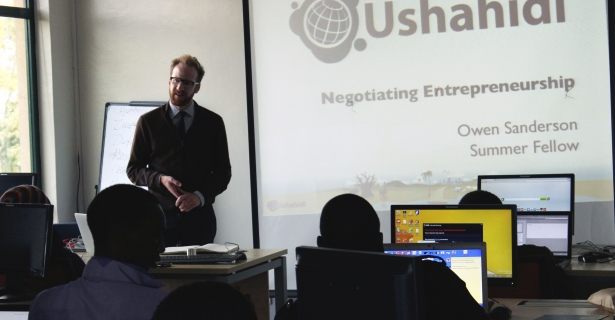Owen Sanderson is a candidate in the International Business Relations and Innovation program at the Fletcher School (MALD '15) and is also an Empower Fellow.
One of the main reasons I am in Kenya this summer is to get to know the incredible entrepreneurs working out of the iHub (and its sister mobile hacker space called the m:lab). The brainchild of Erik Hersman, the iHub was founded in 2010 to provide a laboratory for the future leaders of Africa’s knowledge economy. Located a floor below the iHub, the m:lab focuses on mobile app development. It offers both training and accelerator services to young Nairobians hoping to make a big splash in Africa’s dynamic mobile marketplace.
Both the iHub and the m:lab have sparked a bit of a revolution here in East Africa. The iHub has been called the “unofficial headquarters of Kenya's tech movement.” But new hubs and hacker spaces are opening up each month. Several studies have been completed in an attempt to map Africa’s rapidly emerging tech ecosystem—yet with the current pace of growth it is difficult for the researchers to keep up. This is indeed good news. Each new workspace offers more and more opportunities for budding digital moguls to find support, fellowship, and (with luck!) capital.
That’s where I come in. While I cannot provide seed funding to associates at the iHub or m:lab (being a poor graduate student of international affairs), I can serve as a makeshift mentor. I received two small grants from Tufts' Institute for Global Leadership and Harvard’s Program on Negotiation to train these tech-savvy entrepreneurs interest-based negotiation skills. I believe that teaching these fundamental skills can create real change for techies living at the base of the pyramid. Consider how an entrepreneur trained in negotiation skills has the ability to convince a supplier to cut him or her a better deal, persuade a donor agency to support a specific cause important to his or her business, or influence a customer to purchase a particular life-changing product. As an advocate of market-based approaches to poverty alleviation, I am confident that extending negotiation skills to these entrepreneurs will shift the balance of power towards their small and growing businesses.
With this in mind, tomorrow afternoon I will work with 15-20 fellows at the m:lab exposing them to a few tricks of the negotiation trade. While I do not claim to be an expert by any means, I am hopeful that the lessons I learned through my International Negotiation field of study at The Fletcher School and via the semester-long Negotiation Workshop with Professor Bob Bordone at Harvard Law School will translate well across international borders. Tomorrow’s session will focus on the basic ingredients necessary for an ideal negotiation: communication and collaboration. While we won’t have time to run through a full negotiation simulation, I am confident that introducing these entrepreneurs to communication and collaboration tools like active listening and agenda setting will provide a glimpse into the exciting world of negotiation. I plan to follow-up the session with a more in-depth half-day seminar for those truly interested in building a robust negotiation toolkit.


Add new comment